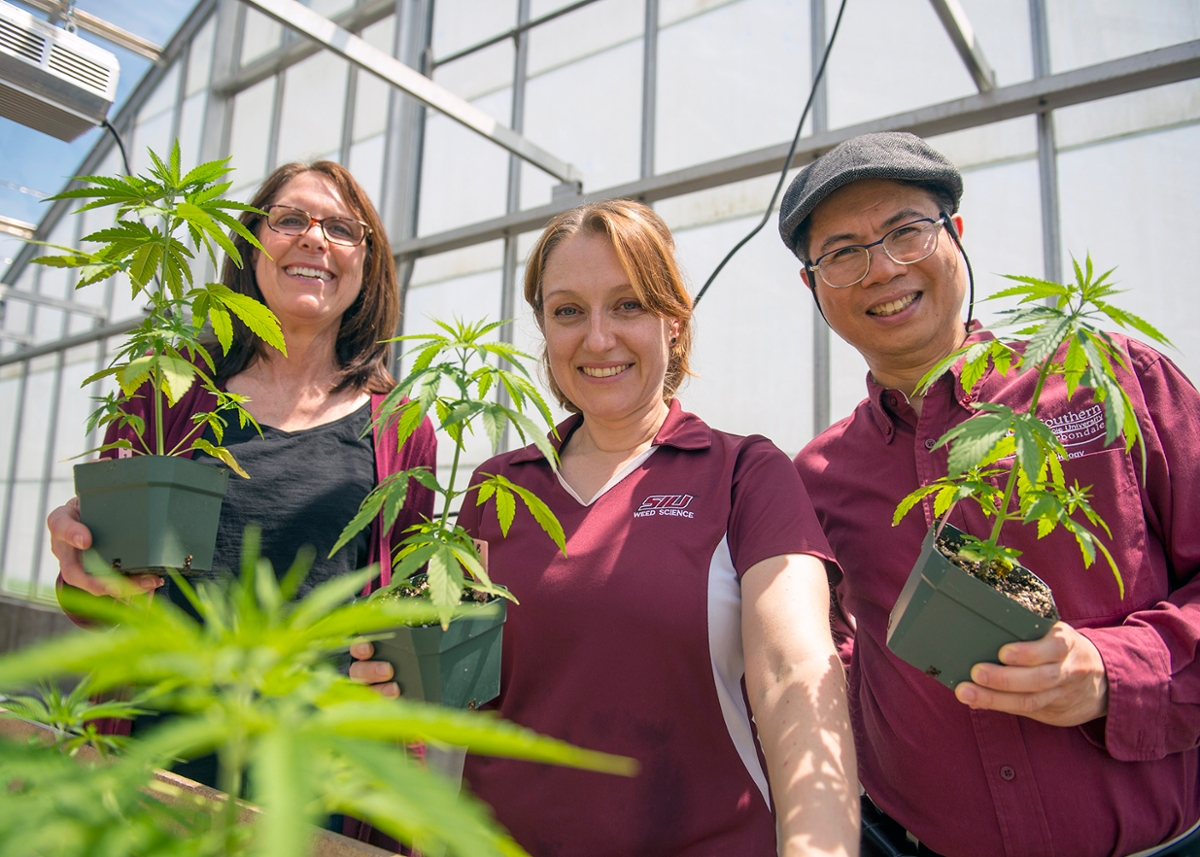
Karen Midden, interim dean of the College of Agricultural Sciences at SIU, along with Karla Gage, assistant professor of plant, soil and agricultural systems, and Aldwin Anterola, associate professor of plant biology, show some of the hemp plants grown in a university greenhouse. The more than 500 industrial hemp plants are aimed at producing CBD oil and are destined for the fields of a local start-up company. The plants are part of SIU’s cannabis science initiative, which seeks to train scientists, growers, marketers and farmers for the emerging opportunities associated with the plant. (Photo by Russell Bailey)
June 12, 2019
Researchers sprout hemp plants, plan new class for cannabis science initiative
CARBONDALE, Ill. — Tucked away in a university greenhouse, the future of Southern Illinois University Carbondale’s cannabis science initiative is sprouting.
More than 500 industrial hemp plants aimed at producing CBD oil and destined for the fields of a local start-up company are rising from containers under the watchful eye of Karla Gage, assistant professor of plant, soil and agricultural systems at SIU. Gage, along with Aldwin Anterola, associate professor of plant biology, are working under a Department of Agriculture research permit to look into the science of growing, harvesting and finding industrial and medicinal uses for the plant.
It’s all part of the cannabis science initiative at SIU, which seeks to train scientists, growers, marketers and farmers for the emerging opportunities associated with the plant.
After making the plant legal for medicinal use a few years ago, Illinois recently took steps to legalize cannabis for recreational use as well. SIU’s work at this point, however, will focus only on its industrial, agricultural and medicinal uses.
Industrial hemp in Southern Illinois
Industrial hemp by definition must contain no more than .3 percent THC, the psychoactive chemical found in medicinal and recreational marijuana. The 540 plants Gage is growing are destined for Big Muddy Hemp Farms, a local start-up company. The plants in this case are being grown for their “flower,” where about 17 percent of its total CBD oil content will be found at maturity.
Gage’s research will be centered on the plant’s industrial uses, as well as its possible role as an alternative crop or anti-noxious weed crop that might help farmers control weeds with less herbicide.
“Certain environmental factors can affect that, and those are things we’d like to know,” Gage said. “With dense plantings, the fiber varieties might be able to close canopy and out compete other weeds for sunlight. But there are a lot of factors in early season that impact that.”
At the present time, Gage and her students are studying the basic agronomy of industrial hemp. Another planting is scheduled for fields located at Touch of Nature Environmental Center, where researchers possibly will grow a dual-purpose variety that produces both fiber and grain – hemp seed – for study.
New program creation on track
With industrial hemp and medical marijuana on the rise, business and agriculture need more trained cultivators and technicians, and farmers want to know more about how they could benefit from these markets. Late last year, SIU announced its intentions to meet those demands with a new, interdisciplinary initiative to train students and help farmers and growers make better-informed, science-backed choices in their operations.
The effort involves areas one might expect, such as agriculture and plant biology, but also chemistry, engineering, business, ecology and other disciplines. SIU’s cannabis science initiative is aimed at creating a program to support agriculture and industry with solid research and top-notch training.
Karen Midden, professor of plant, soil and agricultural systems, said efforts to get the new degree in by 2020 are on track, with faculty busily filling out paperwork and planning classes.
Interest remains high in the program, Midden said, adding she personally knows of six to 10 new students who are planning to attend SIU specifically to study cannabis science.
“I’ve heard from existing students and students all over the U.S. saying they want to go into this career,” Midden said. “Farmers want our students to learn about it. Retired people who want to go into business, and others, too. They’ve started to understand having the science background to grow cannabis is what you need.”
Many of the classes needed to create the program already exist and need only be grouped together under the new program heading. This means even though the program has not yet been approved, students interested in pursuing it can begin taking classes that eventually will count toward it.
Faculty also will need to create a few new courses, however, and Anterola has one of those on tap for this coming fall. “Cannabis Biology” will be offered online and in a classroom setting with no pre-requisites.
Anterola, who is heading up the program’s medicinal focus, said the class will aim to clear up misinformation about cannabis and cannabis-related products, such as CBD oils, as well teach about the plant itself and its many uses and applications.
“The class isn’t just for those who want to go into the industry but is kind of an introduction for anyone who’s interested and consumers,” Anterola said.
